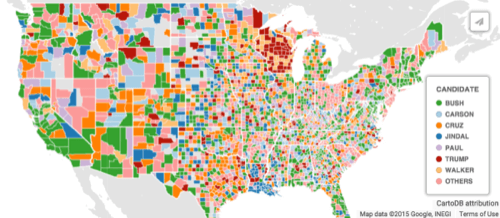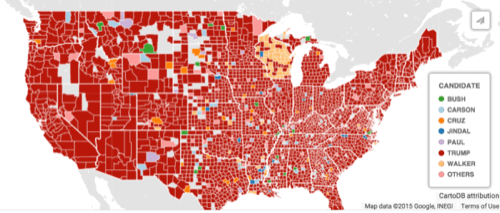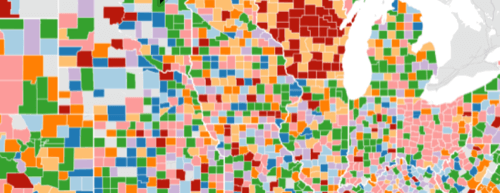
This post appears courtesy of the Ferenstein Wire, a syndicated news service. Publishing partners may edit posts. For inquiries, please email author and publisher Gregory Ferenstein.
Google Trends has been known to predict stock market trends or hidden racial stereotypes for presidential candidates. Now Google News Lab’s latest map of the most-searched Republicans suggests that the GOP’s bid for the White House is still anyone’s game.
Although Donald Trump technically dominated the searches, which was broken down by state and county, that likely hinged more on curiosity than voting interest. Otherwise, the map looks like a fairly level field.
The use of Google data isn’t limited to the tech giant alone. Search volume data can be valuable for confirming two things: that people have heard of an item (or a person), and that the public is interested. Neither types of campaigns can work without both being in place.
See also: The Best Place For Tech Startups: Still Silicon Valley … For Now
With plenty of public datasets open to savvy developers, virtually anyone can create search data visualizations for any reason—like grabbing publicity or measuring the reach of campaigns, both political and product-driven.
Here’s how Google applied it to its data map of the most-searched Republicans.
Mapping What People Want To Know
At first blush, America appears to be obsessed with Trump. Nearly every single county, save for Scott Walker’s own state of Wisconsin, is crawling with Trump searches.

When you peel back the Trump-mania—which may not last, depending on the news cycle—the GOP field is a practical dead heat. No candidate in particular dominates Americans’ curiosity. Even though Jeb Bush is second in many polls, he doesn’t really dominate the map.

And, in the all-important battleground state of Iowa, there’s fascination with nearly every single candidate, even folks like Bobby Jindal, who don’t rank high in the polls.

Google search volume for each candidate might be a much more valuable source of information than a national poll, both because it is more detailed, and it may unearth a latent curiosity not found by directly asking voters who they like.
Another study found that Google trends could be used to predict that an extra 3 million people may have registered to vote, if the deadline were extended. Google’s tools are a powerful way to test a variety of hypotheses.
The tech community and the political candidacy field for the Presidency share a few similarities. Both are massive, and contenders scramble to stand out from a noisy crowd. Public sentiment can swing wildly from month-to-month, as new entrants emerge or old ones land in the headlines.
See also: How Small Changes To Google Search Can Punch Your Web Traffic In The Face
In a business setting, having regional search information can be extremely helpful. Google’s search data can reveal what people want to learn more about, and those valuable insights can paint a broad picture of where to focus your efforts.
You can identify where a product has the greatest (or worst) name recognition, as well as determine beta test markets, pinpointing areas ripe for regional promotions and other uses.
Taking a cue from Google, you might even be able to nab some publicity with relatively little effort. To start, you need to identify a fascinating or unique type of search, one that is ideally related to your expertise, and then map out the data points. The picture that takes shape can tell its own story to inform your company or its potential customers.
*For more stories like this, subscribe to the Ferenstein Wire newsletter here.

















